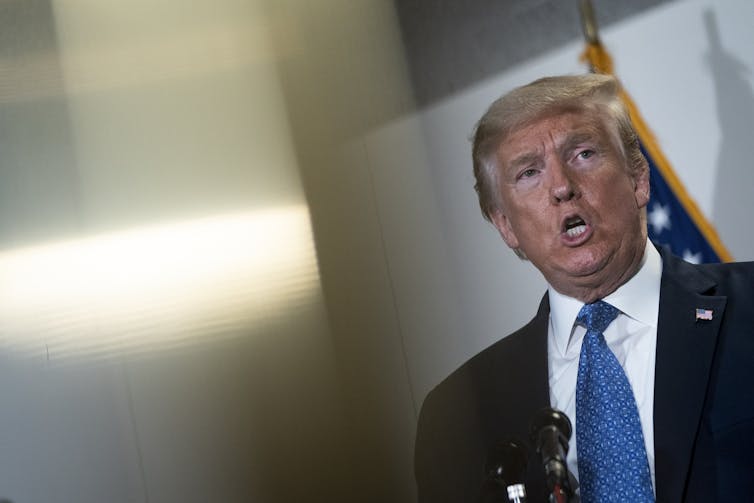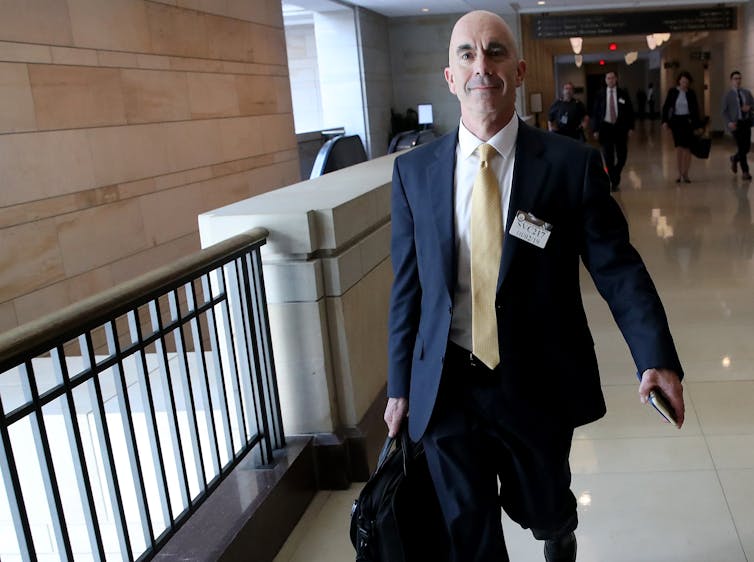
Experts in autocracies have pointed out that it is, unfortunately, easy to slip into normalizing the tyrant, hence it is important to hang on to outrage. These incidents which seem to call for the efforts of the Greek Furies (Erinyes) to come and deal with them will, I hope, help with that. As a reminder, though no one really knows how many there were supposed to be, the three names we have are Alecto, Megaera, and Tisiphone. These roughly translate as “unceasing,” “grudging,” and “vengeful destruction.”
Another week, another postponement. But I do think this article is important, and has implications far beyond its immediate subject – which I see as being “What good does it do to have an official in place to oversee government activity when the very person they are investigating has the power to fire them?” That is certainly an important question.
But an even bigger question with wider application, in my opinion, is this: There is no guarantee that an elected official will have integrity. Many people who lack it manage to coax enough votes from the electorate to get into office. There is also no guarantee that an appointed official will have integrity. Officials appointed by someone who lacks integrity will probably lack it also. Even a confirmation process – as we have seen – will not guarantee integrity on the part of officials appointed by someone who has none. How, then, should we design our processes to ensure the maximum possible integrity in officials?
There is an ongoing debate in America as to whether judges should be elected, or appointed – federal judges by the president, state ones by the governor. And, once appointed, to whom should they be accountable? Our different states and the federal government have come up with various answers, none of which is even close to perfect.
Then there is the matter of decennial redistricting after each census. Different states have different answers to this too – but it’s a similar problem. A redistricting should have integrity, just as an official should. Some states’ solutions work better than others. Perhaps looking at how states handle redistricting would give us some ideas, if not firm answers.
Perhaps if we can manage somehow to answer this question with regards to inspectors general, the answer may provide some assistance in answering it with regard to judges as well. I hope so.
================================================================
Congress may not like it when Trump fires an inspector general – but it can’t do anything to stop him

Stanley M. Brand, Pennsylvania State University
President Donald Trump’s late-night firing of the State Department inspector general is only the latest in his purge of – and resistance to – these independent and nonpolitical law enforcement officers.
Trump isn’t the only president to get rid of inspectors general.
President Ronald Reagan attempted to fire and replace all currently serving inspectors general upon his assuming office in 1981. But he backed off and ultimately allowed many of them to continue in office.
President Barack Obama removed the inspector general of the Corporation for National and Community Service in 2009 without significant opposition.
But Trump had already discharged three inspectors general before the latest firing, which goes beyond previous presidents’ attempts to rein in these officials. And he has couched his actions in language that reflects his longstanding resistance to oversight by Congress of his administration and the executive branch.
And it appears Congress can do little about these firings.
Resisting oversight
Among the others fired by Trump are the Intelligence Community inspector general, whose release of a CIA employee’s whistleblower complaint prompted impeachment proceedings.
He got rid of long-serving acting Department of Defense Inspector General Glenn Fine. Fine was slated to lead the new Pandemic Response Accountability Committee created by the CARES Act, the coronavirus relief bill.
Trump also pushed out Christi Grimm, the acting inspector general at the Department of Health and Human Resources. She was fired after issuing a report critical of the administration’s handling of pandemic testing.

In a related attempt to place loyalists in these oversight positions, Trump replaced Fine with a former White House counsel who had participated in his impeachment defense.
Trump has resisted Congress’ attempt to hold his administration accountable in spending the pandemic recovery money, challenging the inspector general’s ability to directly communicate with Congress. He claims that for the inspector general to do so without his permission would violate the Constitution.
Executive departments and agencies – like the Departments of State or Defense – often butt heads with inspectors general over access to documents or investigation of high-ranking appointees. But Trump’s challenge is the broadest and the first to ground dismissals in response to investigations into his own conduct or the conduct of his administration.
Saving taxpayer money
The Inspector General Act of 1978 was one of the many post-Watergate government reforms. It aimed to increase government accountability and prevent waste, fraud and abuse in agencies and programs.
President Jimmy Carter called the Inspector General Act “perhaps the most important new tool in the fight against fraud.”
Whether ferreting out fraud in defense contracts, investigating Medicare scams or identifying government employees who submitted false expenses, inspectors general have played a major law enforcement role.
The inspectors general are appointed by the president and confirmed by the Senate. The law states that inspectors general are to be appointed “without regard to political affiliation” and solely on the basis of integrity and demonstrated ability in accounting, auditing, law, financial analysis or investigations.
There are now 73 inspectors general with 14,000 employees who monitor federal agencies from the Department of Defense and Energy to Amtrak, the Postal Service and the Library of Congress.
Since 1978, they have audited thousands of programs, referred hundreds of cases for criminal prosecution and recovered billions in taxpayer dollars.
‘Loss of confidence’
The president appoints the inspectors general and may remove them, as he may remove most executive branch appointees.
Beyond that power wielded by the president, inspectors general are independent. While they are under the “general supervision” of the head of the department or agency where they work, they do not report to and are not subject to supervision by any other officer in the government or agency.
In fact, the law says that “Neither the head of the establishment nor the officer next in rank below such head shall prevent or prohibit the Inspector General from initiating, carrying out, or completing any audit or investigation, or from issuing any subpoena.”
The president must communicate in writing the reasons for removal of any inspector general. In the removal of the State Department inspector general, President Trump sent a terse letter to Congress, saying that he his reason for firing Linick was that he “no longer” had the “fullest confidence” in him.
Republican Sen. Chuck Grassley of Iowa, a decades-long champion of the role of inspectors general, stated that a “general lack of confidence simply is not sufficient detail to satisfy Congress.”
Despite congressional uproar over these dismissals from Democrats and some Republicans, there is serious doubt about what conditions or limits Congress could place on the president’s power to remove the inspectors general.
Under Supreme Court precedents related to the principles of separation of power, Congress – one branch of government – cannot remove an official in the executive branch – another branch of government – except by impeachment. That has been interpreted to mean, by inference, that Congress has no power over the president’s ability to fire an executive branch official, including inspectors general.

Echoes of previous Trump claims
Where Congress has attempted to exert some control over inspectors general is through requiring that they provide information to Congress to assist in its oversight function.
For example, the law that created the position of inspectors general requires them to report immediately to their agency head when they become aware of particularly serious or flagrant problems, abuses or deficiencies in agency programs.
That information, in turn, must be transmitted to Congress within seven days.
A separate provision states that nothing in the law shall be construed to authorize withholding information from the Congress.
But disputes have arisen between Congress and the executive branch over the interpretation of these provisions.
Indeed, part of President Trump’s reason for dismissing the Intelligence Community’s inspector general was based on that inspector general’s release to congressional committees of the whistleblower complaint that kicked off the Ukraine impeachment inquiry. The president has asserted that inspectors general have no constitutional right to investigate him, the chief executive of the nation.
No president until Trump had asserted that by reporting findings to Congress, inspectors general were making unconstitutional intrusions into presidential and executive branch prerogative.
The president’s signing statement accompanying the CARES Act was dominated by objections that the legislation “violates the separation of powers by intruding upon the President’s power and duty to supervise the staffing of the executive branch.” Trump argued that he would not heed the CARES Act requirement that an inspector general report directly to Congress on the law’s administration. They would only do so, he wrote, under “presidential supervision.”
This argument – that as president, he is beyond accountability – echoes the claims Trump has raised as he fights congressional subpoenas for his tax returns and private records from his businesses in two cases argued before the Supreme Court recently.
Whatever answer the court delivers in those cases, it’s not likely to stop the president from firing another inspector general. And it doesn’t look like Congress has the power to stop him.
[You’re smart and curious about the world. So are The Conversation’s authors and editors. You can get our highlights each weekend.]![]()
Stanley M. Brand, Distinguished Fellow in Law and Government, Pennsylvania State University
This article is republished from The Conversation under a Creative Commons license. Read the original article.
================================================================
Alecto, Megaera, and Tisiphone, it is probably impossible to design a system which excludes all candidates (and systems) who lack integrity from public office. But surely we can do better than we have so far. If anyone knows integrity, dear Furies, it’s you. Please help us.
The Furies and I will be back.
11 Responses to “Everyday Erinyes #216”
Sorry, the comment form is closed at this time.

There were two fired that Fri.–this one got far less press…https://www.politico.com/news/2020/05/19/democrats-blast-removal-of-acting-dot-inspector-general-268611
CA’s redistricting commission came via a proposition pushed by the GOP, when Independents were beginning to outnumber both parties, term limits had been in place for legislature and others for a long time, and DEM majority had consistently drawn districts to protect incumbents of any party. Current maps were done by that commission and it was the GOP who were unhappy and tried to stop them in court. Best guess is that they had hoped for a biased outcome in their favor somehow. With at least one earlier legislative redistricting process I recall some great negotiations of agreements on the process in exchange for bipartisan support of some significant legislation. Not unlike the discussions on the national level, lots of misinformation flowed around redistricting, its proposition and other propositions. I think our disclosure rules, as more misinformation efforts using methods not specified in existing laws happens each year, will continue to evolve and create an element that makes the independent commission approach work better.
Here is a 1981 article I found about what Reagan didhttps://www.nytimes.com/1981/03/27/us/reagan-reappoints-five-to-be-inspectors-general.html
Trump will do anything he can think of to avoid being overseen, inspected, by anyone, unless he works by still more nepotism. He has lived in his own little world all his life, and wishes to have no one interfere with his agenda, which is, at bottom, only abut getting whatever toy he wants, whenever he wants it. He has no other “plan,” and operates by dealing with whatever is the current crisis…totally unaware that he brought it on himself.
As for the bigger question, integrity is needed all around, obviously, but too many people don’t care about it, as long as the lack of integrity in those they elect serves their own agenda. Again, I mention the phrase overheard at the gym, years go: “I don’t mind corruption, as long as I get my share.”
It’s despicable what tRump is getting away with firing these Inspector Generals.
To be firing people for doing their jobs, properly/legally isn’t legitimate. He should be prosecuted for these illegal actions.
He’s committed so many crimes that he should be locked up forever.
He never plays by the official rules, just his own foolishly created one.
I hope that there is enough voters out there in November, to finally get this rotten creep out of the W.H.
Thanks Joanne for the great post.
Gawd, with each passing week, it gets worse. He’s such a cad.
He feels that he is ‘above the law’, and that he’ll just go from day to day, and let America burn with his help.
Shame that he can’t be given time outs with his ‘non presidential’ behavior too.
Yes, Colleen, November can’t come soon enough. For me, anyway.
Thank you, Joanne (and Furies), for your most informative and interesting post.
I’ve never wished harm to anyone … but that dictate is getting harder and harder to follow.
(I’m looking at you, *Rump)
He has made it pretty clear that checks and balances do not work on the honor system when somebody comes along who has none. We really need (by which I mean Congress needs) to make it impossible for anyone being investigated to fire or coerce the investigator(s) Or, as they said back in the day, Quis custodiet ipsos custodes? (Yeah, I’ve kind of broadened the meaning of that. But it needed it.)
Trump: “I’ll Be the Oversight”
Trump’s new corollary to his mind-boggling idiotic thought that “If we didn’t do any testing, we would have very few cases” seems to be “If we don’t have any Inspector General Watchdogs, we’ll have very little corruption.”
Very good article, JD.
I agree with it and all the comments to date!
outstanding article, as normal….thank you…
Thanks, Joanne, for another excellent article. However, it does make realise that it is a long time until November and makes me shudder at all the things Trump and his cronies can do to demolish democracy in America. Not that there’s too much left to demolish.
So I thought, “Well, there’s … no. I’m not going to put anything in writing so as to give them any ideas.”